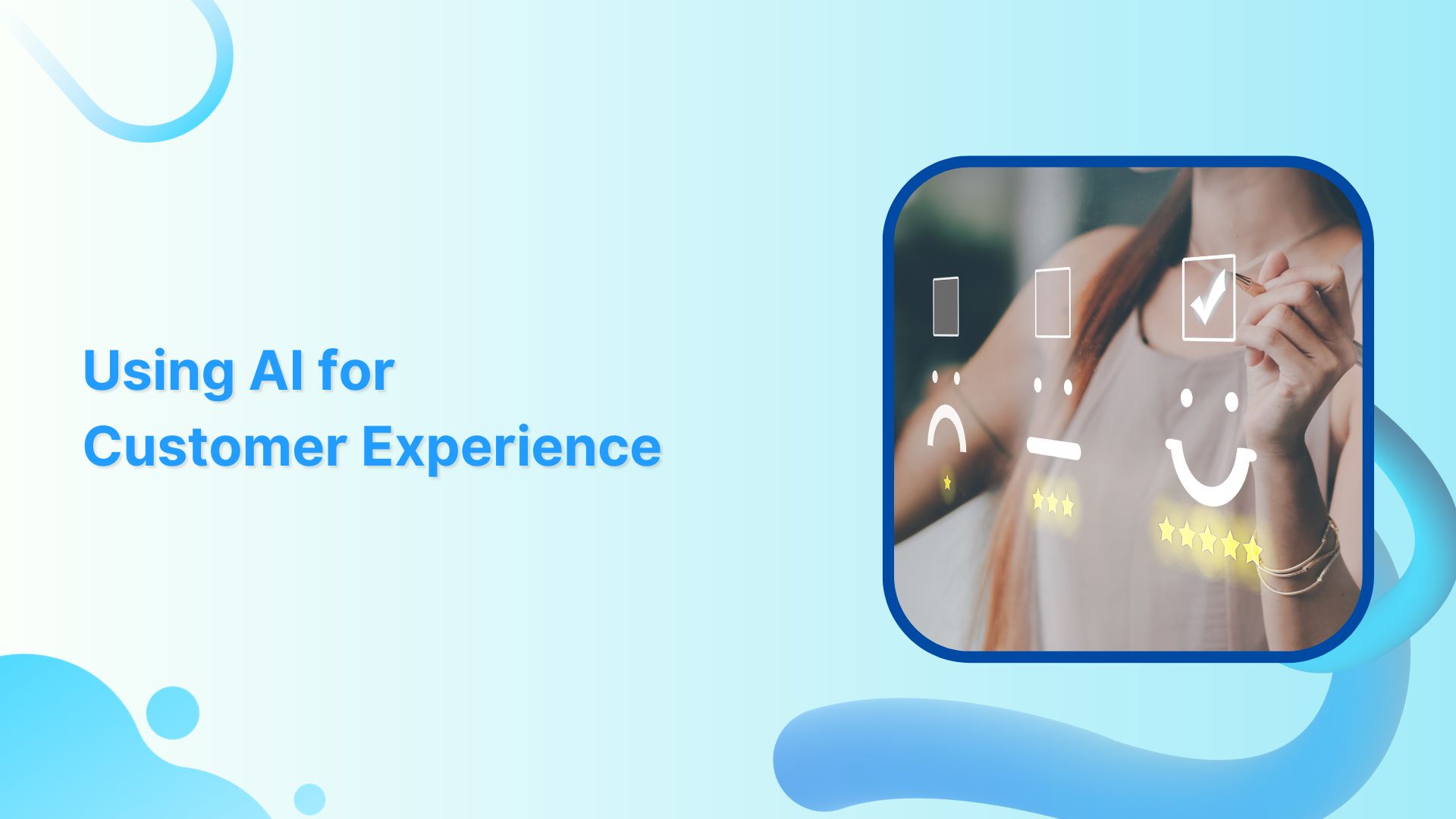Artificial intelligence (AI) has already revolutionized computer programming, electronics, and several other walks of life — surprisingly, it’s just the beginning. One of the key areas of business management is customer support.
Businesses, organizations, and entrepreneurs pay close attention to improving their customer experience to position their brands in the customers’ minds.
Since AI has taken the world by storm, it’s vital to capitalize on AI-powered customer service using all possible means available at one’s disposal.
Let’s crack this topic open and try to comprehend how AI works and how it can improve customer experience without breaking the bank.
The easiest way to manage and grow your social channels.
Try ContentStudio for FREE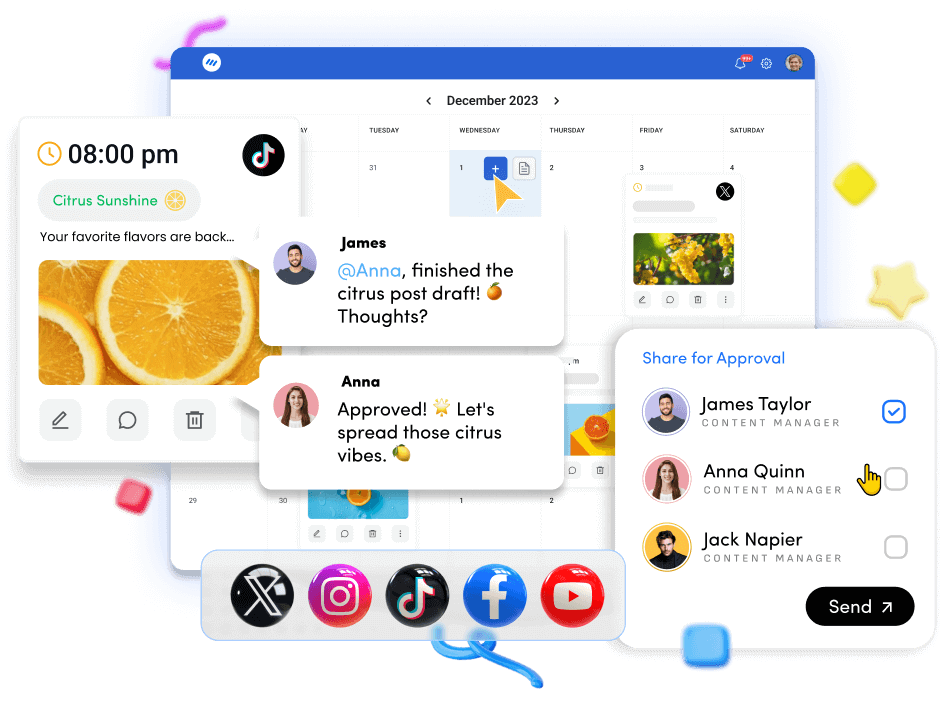
How does AI generally work?
Artificial intelligence (AI) processes extensive amounts of data to train its system to figure out patterns, insights, and information and leverage all the training to provide the best-suited outcome in response to the query.
No wonder advanced generative AI tools are now capable of producing realistic text, images, music, and other media and taking AI-powered content creation to the next level.
For instance, an AI art tool goes deep into studying human figures, objects, places, birds, animals, plants, buildings, and much more to feed its knowledge and provides an in-depth output when asked to create an AI-based image.
Similarly, a chatbot can learn from text examples to engage in lifelike conversations and provide to-the-point answers to the prospects when asked about specific details.
Since AI is rapidly transforming and simultaneously shaping technological advancements across different areas, it’s interesting to see what pops up next in this industry.
14 ways AI can improve customer service
Let’s uncover several ways to improve customer service using AI:
1) Auto email responding:
Auto email responding makes customer care service a whole lot better without a doubt. When auto email responding meets AI, it takes the customer support quality to the next level.
The way it works is that it sends quick responses or acknowledgments emails, letting the sender know that their message has been received. This ensures that the sender receives prompt confirmation, which looks professional and helpful.
Moreover, the auto email responding could be even better with AI integration by adding additional features, such as connecting with the appropriate department or recommending the relevant knowledge base articles.
Example: Wondershare autoresponder

Wondershare sends out an auto responder when someone emails their support department. They could be a little bit more creative with their autoresponder email by adding relevant content or other details for customers’ assistance.
2) 24/7 chatbot assistance:
AI chatbots are hands-down one of the best ways to capitalize on AI technology in customer care. These AI-powered chat agents provide live chat support services around the clock, ensuring that customer queries are addressed instantly
Who wouldn’t like a 24/7 virtual AI assistant to help guide the prospects and customers on the website? It sure is one of the best use cases of AI in improving customer experience.
A lot of SAAS companies and e-commerce stores have already been using AI chatbots to engage and convert website visitors. Paired with a virtual call center, businesses can automate support while still offering personalized human interactions when needed.
Example: ProductHunt Chatbot
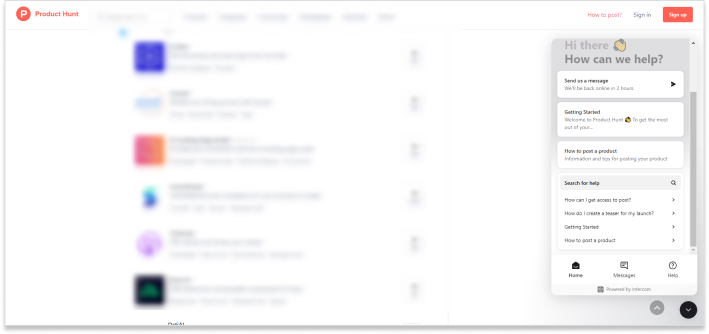
ProductHunt is a SAAS tools discovery platform that allows SAAS companies and indie developers to publish news and updates regarding their startups and software projects.
3) Personalized recommendations:
AI-driven personalized recommendations are a must-have feature in the e-commerce and digital product selling genres. It allows customers to discover relevant products without spending time on the hunt, thanks to AI.
The way it works is that it looks through the user’s past behavior and preferences, and then uses the power of AI to suggest products, services, or content that matches the user’s interests.
Example: Amazon Product Recommendations
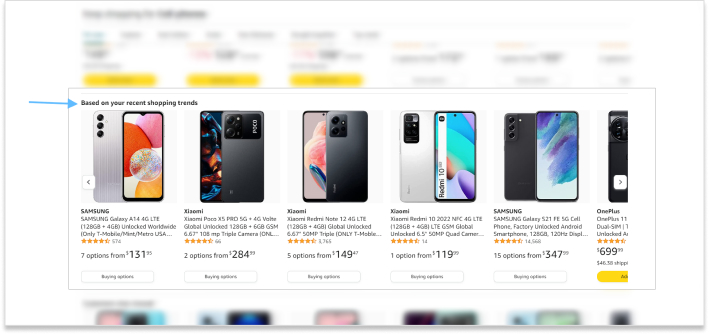
Amazon does this quite well. The e-commerce giant uses personalized recommendations to suggest relevant products to the users.
4) Knowledge base article suggestions:
A knowledge base is an articles repository on a SAAS or business website. It operates like a library of helpful articles related to the brand or its products.
The AI integration cranks customer service up a notch. It can recommend relevant articles from a company’s knowledge base, ensuring that the customer finds the most useful information rather quickly.
Example: Canva Live Chat

Canva live chat instantly asks about the topics the user is interested in, so it could steer them in the right direction. It could also recommend the knowledge base article if required.
5) Transaction fraud detection:
One of the benefits of AI is transaction fraud detection, which acts as a silent guardian for customers’ financial transactions.
Large-scale e-commerce brands and online businesses pay close attention to implementing a transactional fraud detection system to safeguard transactions.
This system monitors credit card and other wallet transactions on the merchant’s end and keeps an eye on any unusual or suspicious activity. When something fishy pops up, it can quickly alert the company or restrict the transaction to avoid any financial issues.
Example: NayaPay Debit Card 3D Secure Payments
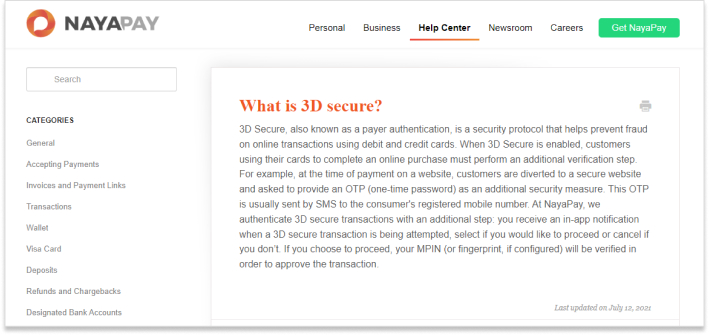
NayaPay is a financial service that provides online wallets, debit cards, and several other transactional facilities. One of its security protocols is 3D secure payments which ask users to confirm the debit card transaction through in-app notifications.
6) Automated social media messaging:
Social media is one of those industries where AI-powered tools and softwares are revolutionizing the whole system.
Companies, social media influencers, and experts use AI to provide quick and efficient responses to your social media inquiries, create content in bulk, and schedule social media content at scale.
Example: ContentStudio

ContentStudio is a state-of-the-art social media management dashboard that provides users with a complete set of tools to manage, publish, schedule, and analyze social media content across all major social media platforms. With AI integration, ContentStudio has gotten even better. Sign up for a 14-day free trial!
7) Fingerprint recognition:
Fingerprint recognition is the latest AI-based technology that is being used in the latest smartphones, ATM machines, and biometric verification.
It works because AI uses the consumer’s fingerprint as a biometric identifier to unlock the smartphone or access sensitive information, ensuring access only upon the user’s approval.
Some payment processing and banking apps require fingerprint recognition to access the app or complete the transaction if the user activates the fingerprint security.
Example: Smartphone’s fingerprint

8) Dynamic pricing:
Dynamic pricing is a programming technology where every customer gets customized pricing based on the product or service selection.
AI is used for price optimization to provide customers with an accurate pricing deal, whether you’re booking a flight or purchasing an online web service.
Example: ConvertKit pricing
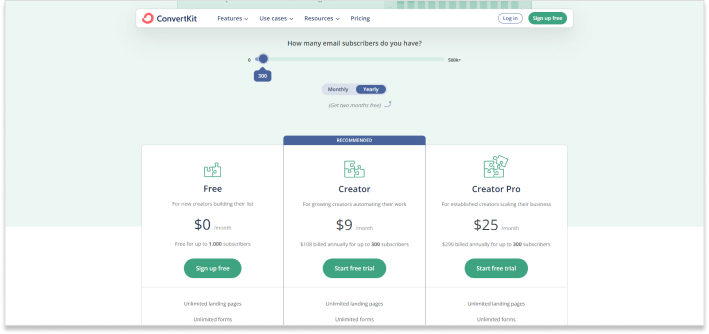
ConvertKit is an email marketing software that allows users to select parameters such as the number of email subscribers and monthly or annual payment plans to make a pricing plan.
9) Shipping charges estimation:
AI can easily be integrated into the shipping businesses, making freight and delivery easier and more reliable than ever.
It can help customers determine the cost of sending a package. It considers factors like the size, weight, destination, and shipping duration for clarity. Moreover, it can also help shipment and courier services make their processes faster.
Example: UPS Shipping cost
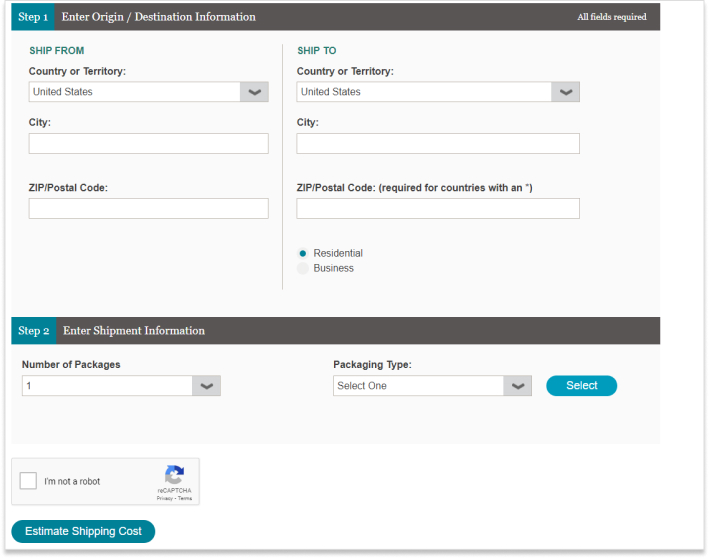
UPS like many other shipping companies uses a shipping cost estimator tool to let the customers know about their estimated shipment cost.
10) Web accessibility support:
Web accessibility is a requirement that publicly available websites have to fulfill based on the territorial regulations they are operating in or serving the audience from. The use of AI in the web accessibility area is a game-changer.
The application of web accessibility settings makes the internet more inclusive for all users. It ensures that users with disabilities navigate websites more easily by providing voice, imaging, and large text options.
Example: HubSpot Blog
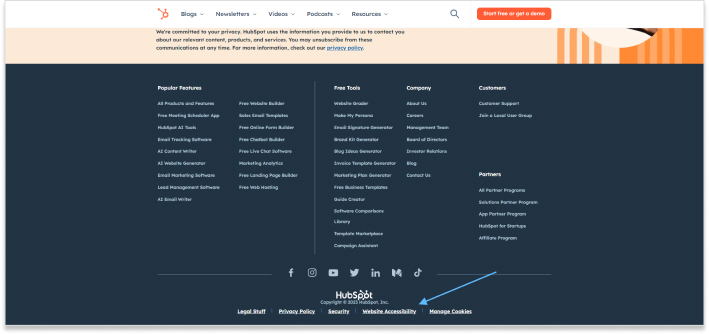
Hubspot understands the importance of web accessibility requirements and adheres to publishing standards by making its content accessible to all.
11) Face ID for authentication:
Face ID is a modern-day method of authentication available across different devices and security systems. It sure provides an extra layer of security for the business or property owners.
It uses the power of AI to scan and recognize the person’s facial features, ensuring that only authorized person gets access to the area, device, property, or data.
Example: Smartphones Face ID

Most smartphones have a Face ID system that allows users to keep their contacts, data, and information stored in the smartphone devices safe and secured.
12) Email segmentation:
Email segmentation is a convenient email list management strategy to divide email newsletter subscribers into their relevant categories.
A lot of email marketing softwares has integrated AI into their softwares to make it easier for the users to send email newsletters to the audience. AI integration helps businesses and marketers segment, categorize, and prioritize important email addresses in your email list.
Example: Authority Hacker

Authority Hacker often does surveys to find the current state of the SEO. However, one of the purposes of these surveys is to do audience segmentation for better reach and improved targeting in the future.
13) Recurring payment reminders:
AI seamlessly works in the payment processing area. Most of the payment processing softwares uses AI to send out reminders about recurring bills, subscriptions, or payments to help the customers stay organized and informed.
It can save them troubles like service termination, late fees, or service interruptions. It immensely improves their customer experience when the services remain uninterrupted.
Example: Matt Zimmerman
Matt Zimmerman is a software engineer. He sends out automatic recurring payment reminders to the paid users.
14) Real-time language translation:
Social media platforms, mobile apps, and online portals have introduced real-time language translation using the power of AI with tools like translation management platforms (TMS).
It enables users to understand and communicate in multiple languages instantly with just one click whether you’re consuming social media content on the couch or buying a coffee at an airport. It sure breaks down language barriers and fosters global relationships more than ever.
Example: Crisp
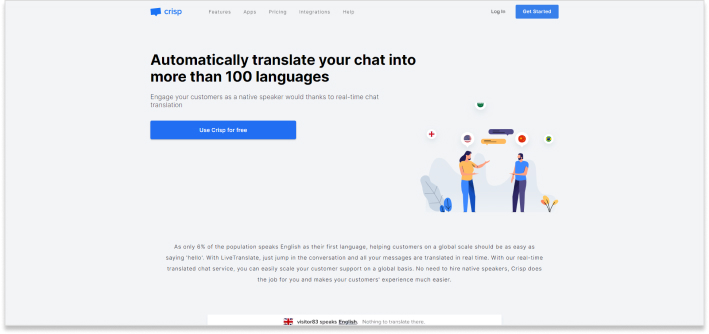
Crisp is a well-known virtual assistance and AI chat tool for websites, blogs, and SAAS companies. It has several top-notch features to help provide customer support to the customers. One of the features is real-time language translation in over 100 languages using AI.
Benefits of AI in customer service
Some of you might be on the fence about implementing AI in your customer service, so these benefits of AI integration in customer care service would change your mind:
i. Prompt action on the queries
One of the major benefits of using AI in customer service is the rapid response from the support department. It enables companies to satisfy the customers better or convert the prospects into paying customers.
Since AI is integrated with the customer care software, it responds to customer queries within no time. Taking prompt action on the customers’ queries allows companies and entrepreneurs to build a good rapport with the customers and prospects.
AI-powered customer care software and a modern business phone system offer near-instant responses, improving service efficiency. Multichannel platforms like Crisp and Help Scout are great for businesses seeking fast interactions. (Here’s a detailed guide with an in-depth comparison of Crisp and Help Scout, helping you choose the best tool for your needs.) These platforms streamline communication and help businesses build lasting relationships by responding quickly to customer inquiries.
Here’s an example:

AffiliateBooster is an affiliate marketing plugin for WordPress users. It allows users to create product tables of affiliate products for increasing clickability and sales. The team at AffiliateBooster responds quickly when a visitor uses the chat tool to send out a message.
ii. Less human resource utilization
Another benefit of implementing the AI-based system in customer service is that it requires less human resource allocation. Since AI would be doing the major heavy lifting, it’d allow the company to spend less human capital on customer service.
The companies could cut their costs by hiring fewer staff members in the customer care department, or else the staff could be focused on personally helping the premium customers.
A lot of companies use AI-powered customer services such as AI voice agents to guide prospects and existing customers.
Take a look at this example:
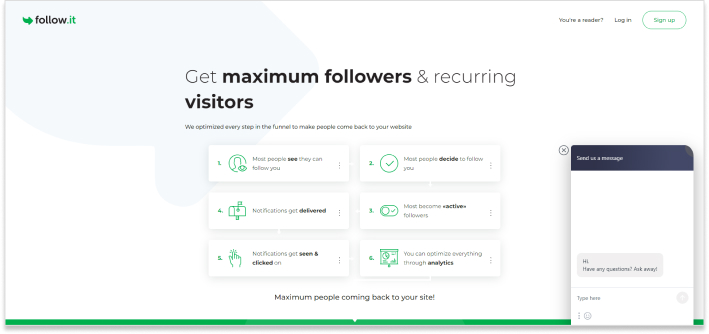
Follow.it is a powerful tool to create push notifications for website owners. They are using an AI-powered chat tool for website visitors’ engagement and conversion.
iii. Automated chatbots for support
Automated chatbots are a great way to engage and convert prospects into paying customers. One of the biggest perks of chatbots is that they’re extremely effective in the visitors’ engagement.
Most people who start conversations with a chatbot want to see how good the chatbot is or they want a quick solution from the company so they don’t care where it comes from.
Check out the automated chatbot for support example: Namecheap

iv. No more waiting queues
One of the benefits of AI in the customer care area is that customers don’t want to wait in long queues. Most customers and prospects hate customer care queues and might be happy to chat with an AI-assisted chatbot.
Here’s an example: Sprinklr

v. Generate more leads
There are chatbot services that allow companies and entrepreneurs to capture leads with their live chat softwares. So the use of AI in customer care could be used as a funnel to build an email list of the prospective audience.
Example: Intercom

Examples of AI in customer service
Companies are using different types of AI-powered chatbots, messengers, and live chat tools to help and engage website visitors. Let’s take a look at some of the examples of companies that are cashing in on chat boxes:
i. Lowfruits
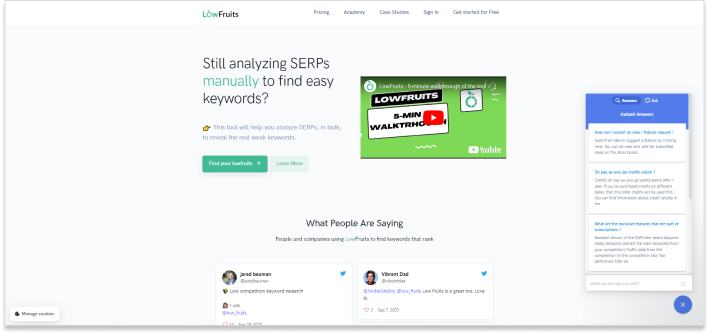
Lowfruits is a keyword research and discovery tool that hunts down the keywords for targeting. They have a chatbox on their website that allows website visitors to get the answers to frequently asked questions or else send out a message to the Lowfruits team.
ii. Usermaven
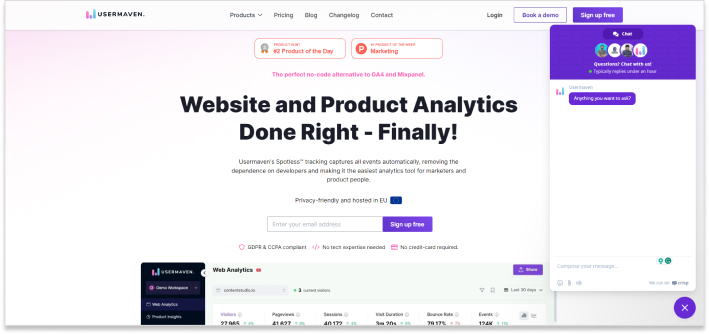
Usermaven is a website analytics tool that allows website and product owners to track website statistics and report all the traffic metrics in an organized fashion. They have a live chat feature on their website to engage the prospects and assist them in making the right decision.
iii. Restream
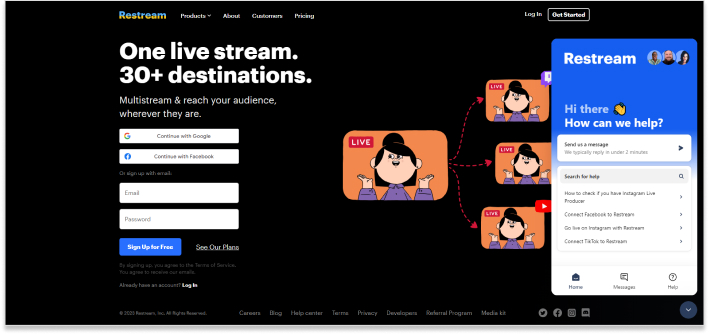
Restream is a live streaming software that helps streamers broadcast their live streams across different social media platforms through Restream. They have an AI chatbox that assists the prospects with FAQs and provides an option to send a message to the Restream team.
iv. Lasso

Lasso is a powerful affiliate marketing tool for creating product boxes on blogs and content websites. They have an AI chatbox that helps visitors access the documentation from the help center and connects the visitors to the support team.
v. Podia
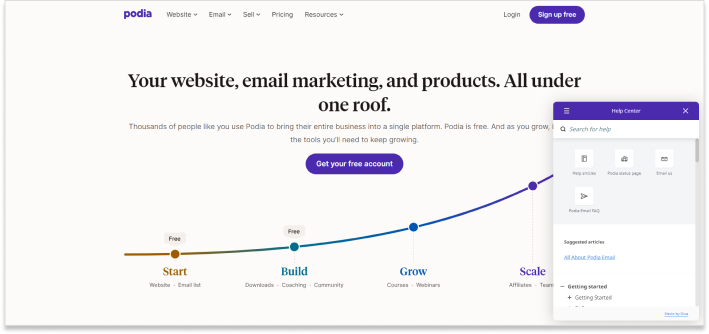
Podia is a complete digital marketing solution for businesses and entrepreneurs who want to sell online courses. Their AI chatbox provides access to the help center, FAQs section, and email support.
What are the challenges of AI in customer service?
Pros and cons of technology go side by side – AI in customer service management is no exception. Let’s try to comprehend what challenges end users or businesses may face when they deploy AI in customer service:
No human factor involved
One of the risks involved with the use of AI in customer service is that there is no human factor involved in the process. The AI will be quite straightforward and trained to answer the queries. However, on the other hand, most humans might be apologetic, humble, and sweet when dealing with customers.
Difficult to navigate for some users
It’s no surprise that AI in the customer service area might confuse some people, especially the ones who aren’t familiar with the idea. When AI chatbots went mainstream and companies started using them on their websites, people (who were used to human live chat) kept on finding the live chat option to talk to a live representative.
Unable to convey the message
One of the risks involved with using AI in the customer care area is that some users might have a hard time conveying their message because of the language barrier. Human customer care representatives might extend their support and try to figure out what the customer is saying or what they really mean. The AI chatbots might not be trained to have a humanized conversation on a deeper level.
Repetitiveness in the answers
AI chatbots and customer care tools are trained with specific directions. They follow the command given to them through the software installed into the system. Sometimes, these AI tools end up repeating the answer instead of understanding the query. It could be caused by a glitch or limited resources of the AI tool being used.
Let’s wrap up
Since AI is on the rise, businesses are infusing machine learning into customer service to ensure a smooth customer care experience for prospects and existing customers.
It’s time to wrap your head around AI-driven customer experience and make the most of the customer engagement opportunities available at your disposal.
Whether you set up chatbots in customer experience or use an AI-powered knowledge base that operates as a virtual assistant for customer experience, the goal is to induct AI into customer service.
If you don’t keep up with the market, the competitors will dive head first and take advantage of the situation. So keep an eye on the developing technologies whether it’s in marketing or customer care and adapt accordingly.
Also Read: AI-Powered Video Marketing: A Complete Guide
FAQS About AI in Customer Experience
How will AI affect customer service?
For the most part, AI will eventually improve the customer service. While the human staff may feel threatened by the implementation of AI in the customer care area, it’s necessary to adapt according to the gameplay rules. More or less, it’s the survival of the fittest.
Will AI replace customer service?
While it seems like AI will eventually replace human customer service, it’s still far away. The human interaction with customers is still very much needed. It’s safe to say that the AI hasn’t gotten there just yet.
